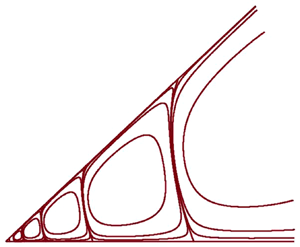Published online by Cambridge University Press: 19 October 2022

Odd viscosity is associated with a number of striking physical phenomena: a disk rotating in a viscous liquid experiences a normal compressive or tensile stress depending on its sense of rotation; chiral active matter interfacial deformations level off in a manner akin to surface tension; and unstable thermocapillary films become stabilized. In this article we show that odd viscosity decreases the size and intensity of Moffatt vortices in a corner formed by a solid substrate and a free interface. The effect is present because odd viscosity creates a normal-stress-induced shear stress at the liquid–gas interface. The new shear stress is out of phase and oppositely directed with respect to the interfacial liquid velocity. It squeezes the vortices and damps their rotation. As a consequence, Moffatt vortices can now be observed with greater facility in an experiment. Odd viscosity also increases the range of corner angles over which Moffatt vortices can be observed, and, in general, it shows a tendency to moderate singular behaviour.